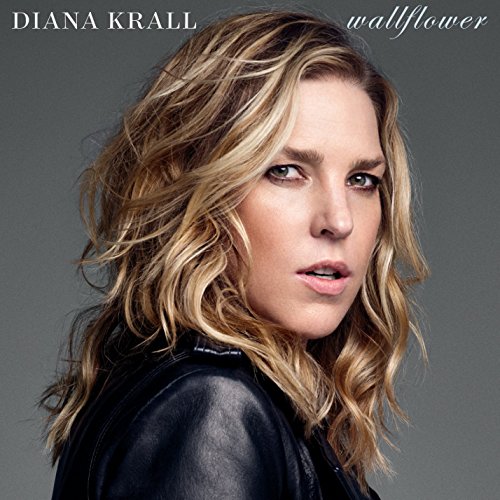
Diana Krall
Wallflower
Release Date: Feb 3, 2015
Genre(s): Jazz
Record label: Verve
Music Critic Score
How the Music Critic Score works
Buy Wallflower from Amazon
Album Review: Wallflower by Diana Krall
Average, Based on 7 Critics
Based on rating 7/10
Diana Krall paid tribute to her father on Glad Rag Doll, the 2012 album sourced from his collection of 78-rpm records, and, in a sense, its 2015 successor Wallflower is a companion record of sorts, finding the singer revisiting songs from her childhood. Like many kids of the 20th century, she grew up listening to the radio, which meant she was weaned on the soft rock superhits of the '70s -- songs that earned sniffy condescension at the time but nevertheless have turned into modern standards due to their continual presence in pop culture (and arguably were treated that way at the time, seeing cover after cover by middlebrow pop singers). Krall does not limit herself to the songbook of Gilbert O'Sullivan, Jim Croce, the Carpenters, Elton John, and the Eagles, choosing to expand her definition of soft rock to include a previously unrecorded Paul McCartney song called "If I Take You Home Tonight" (a leftover from his standards album Kisses on the Bottom), Bob Dylan's "Wallflower," Randy Newman's "Feels Like Home," and Neil Finn's "Don't Dream It's Over," a song from 1986 that has been covered frequently in the three decades since.
Based on rating 3/5
Diana Krall is a jazz pianist and vocalist who has recorded Brazilian music, Thirties jazz and songs co-written with her husband, Elvis Costello. So this collection of favorites by the likes of Randy Newman, the Carpenters, Jim Croce, Bob Dylan and Elton John, among others, fits easily into her tastefully eclectic comfort zone. Krall's elegant, personalized readings and pop veteran David Foster's string-heavy production can give a song like 10cc's "I'm Not in Love" or the Eagles' "Desperado" the glint of a modern standard.
Based on rating 2/5
Diana KrallWallflower(Verve)2.5 out of 5 stars Sophisticated, stylish, sultry and oh-so-tasteful describes jazz/pop singer/pianist Diana Krall’s entire catalog. Her hushed, deep ebony vocals and classy fretwork are perfect for that first Sunday morning cup of coffee. So, to say that this album of 60s and 70s pop ballad interpretations featuring her husky, agreeable but hardly arresting vocals, and notably no jazz, is more of the same with different tunes, isn’t really damning her with faint praise.
Based on rating 2/5
Taylor Swift isn’t the only star who ditched her initial genre to double-down on pop this year. Diana Krall created a parallel move with the new “Wallflower” album. The woozy, inventive jazz singer is trying to cross over to a fresh degree by covering songs that soared high on the Hot 100 during her youth. Towards that end, she mounted warhorses from the 1960s (The Mamas & the Papas’ “California Dreamin’,” Leon Russell’s “Superstar”) and the ’70s (Elton John’s “Sorry Seems to be the Hardest Word,” The Eagles’ “Desperado”).
Based on rating 3/10
Diana Krall is blessed with a great voice, a distinctive and beautifully frayed alto that sounds hip and vulnerable, cool and polished all at once. She also happens to be a fine jazz pianist, and when she emerged in the 1990s (initially on Justin Time, a small jazz label), she was a refreshing voice, akin to the singer and guitarist John Pizzarelli, who was also singing Nat Cole tunes in a cheeky style and bringing a hip take some some slightly older music. But by the late 1990s, Krall had blown up, going beyond a jazz audience while still singing great songs very beautifully (hooray!) but also starting to embody what was least interesting about jazz (boo!).
Opinion: Average
It’s not a put-on. Bob Dylan’s “Shadows in the Night,” an album of 10 songs that were all recorded by Frank Sinatra, is a tribute from one venerated American musician to another, a reconsideration of a school of songwriting, a feat of technical nostalgia and a reckoning with love and death ….
Opinion: Mediocre
It’s always frustrating when an artist follows one of her best, most interesting albums with one of her dullest, and yet Diana Krall doesn’t blink, lurching from the smoky flapper jazz of 2012’s “Glad Rag Doll” to the antiseptic “Wallflower.” Much of the credit belongs to milquetoast megaproducer David Foster, who never met a singer he couldn’t make sound like a Broadway star venturing an oblivious, uninspired pop move. But Krall plays along too eagerly; listening to her wan, rudimentary playing, you’d never know that she’s a deft jazz pianist. Save for “Superstar,” which falls just short of being tranformed into a Julie London torch ballad, Krall’s darkly sultry voice isn’t enough to enliven her material.
'Wallflower'
is available now

